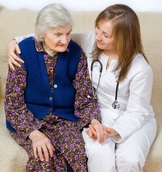Care sector backs National Minimum Training Standard for Healthcare Assistants

The recommendation to train all healthcare assistants made in the Cavendish review published this week has been welcomed by many in the sector.
In the review it was recommended that all healthcare assistants receive compulsory minimum training before being allowed to carry out their role unsupervised.
The report revealed that there is currently no national standard of training for healthcare assistants which has led to a disjointed healthcare system throughout the country.
Toby Siddall, managing director of residential care services at Care UK, said: “Care UK welcomes the recommendations of the Cavendish Review, particularly those which address the need for more in-depth training and career development opportunities in residential care.
"It is essential that professional care workers are trained to a level which means they feel confident in carrying out their responsibilities, and that people accessing care feel comfortable with the support they receive.
"At Care UK training for care workers in our homes goes beyond the minimum requirements. “The thousands of carers in our homes play a vital role in people’s lives and we are very proud of the amazing care they deliver. They do a fantastic job and we are committed to making sure we are able to hold on to them and give them the training and recognition they deserve. This commitment involves offering structured career progression and the chance to gain new qualifications such as NVQs.”
Healthcare assistants are front line staff who are responsible for working and caring directly for some of the most vulnerable people in society whether in their own home, a care home or within a hospital setting.
Martin Green, chair of the National Longevity Centre UK has also praised the emphasis on developing leadership roles in the report described and said: “The Cavendish Review has produced some very sensible proposals that will ensure that both health and social care staff receive appropriate training prior to beginning practice.
![]() Martin Green
Martin Green
“Camilla Cavendish has understood the difference between health and social care, and challenges us all to have a much more systematic approach to the training, development and leadership of staff in the care sector.
“Independent social care providers are ready to rise to this challenge, but we must have a root and branch reform of training funding, to ensure that the resources are available to deliver on Ms Cavendish’s vision for the future.”
The report challenged the many job titles that are currently used to describe the healthcare assistant role, and demanded that a unified job title will further succeed to drive the overall quality of care being delivered through the country.
e-GNCS work with healthcare providers to educate and deliver training to their workforce through both face-to-face and online resources. It has welcomed the move to have a National Minimum standard and has pledged to ensure that healthcare professionals and providers are able to meet these national guidelines.
Chris Aitken, managing director of e-GNCS said: “E-GNCS have welcomed the recommendations made in the Cavendish Review concerning the future role of HCAs and Care Workers as this finally brings together, for all to see, the essential and outstanding contributions that HCAs are making within the health and social care fields.
“E-GNCS is well aware that HCAs are the mainstay of our health and social care systems. The Cavendish Review provides an opportunity to make important changes for the good of patients and staff through the provision of high quality and effective health and social care training and education.
“In some health and social care settings HCAs are highly trained and respected but in other settings this is not always the case. What is required now is for managers to demonstrate their commitment and loyalty to this highly motivated and talented group of staff.
“Cavendish comments that HCAs seem to be undervalued and that their voice has not been heard. E-GNCS will be studying the review in more detail with the intention of responding further to the training needs of HCAs who are employed in various health and social care settings.”
Mr Siddall, of Care UK concluded: “We look forward to seeing the government’s formal response to this review in the autumn to find out whether it can help deliver better care across the country.”
Latest News
 29-Jul-24
Dementia Bus gives carehome.co.uk staff insight into life with dementia
29-Jul-24
Dementia Bus gives carehome.co.uk staff insight into life with dementia
 01-Mar-24
Find out the top care homes in 2024
01-Mar-24
Find out the top care homes in 2024
 21-Mar-23
UK's top care homes in 2023 revealed
21-Mar-23
UK's top care homes in 2023 revealed
 03-Jan-23
carehome.co.uk launches free care helpline
03-Jan-23
carehome.co.uk launches free care helpline
 13-Dec-22
5 mins with Emily Whitehurst, chief operating officer for Constantia Healthcare
13-Dec-22
5 mins with Emily Whitehurst, chief operating officer for Constantia Healthcare